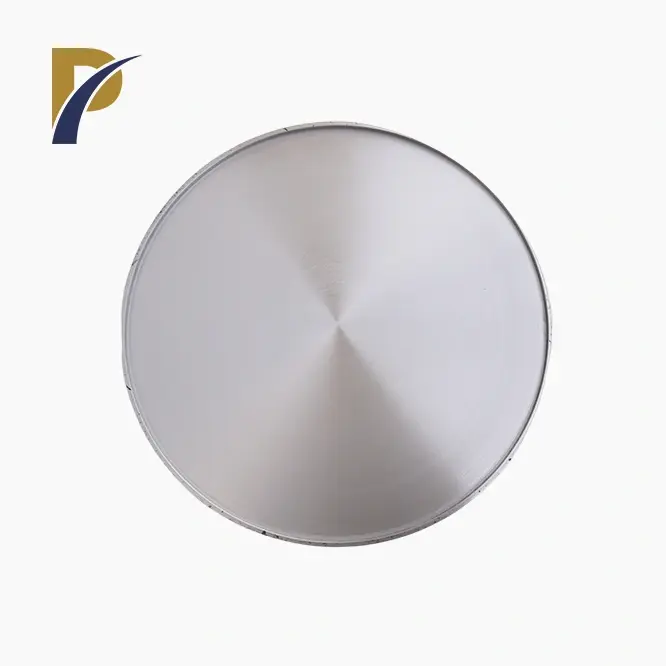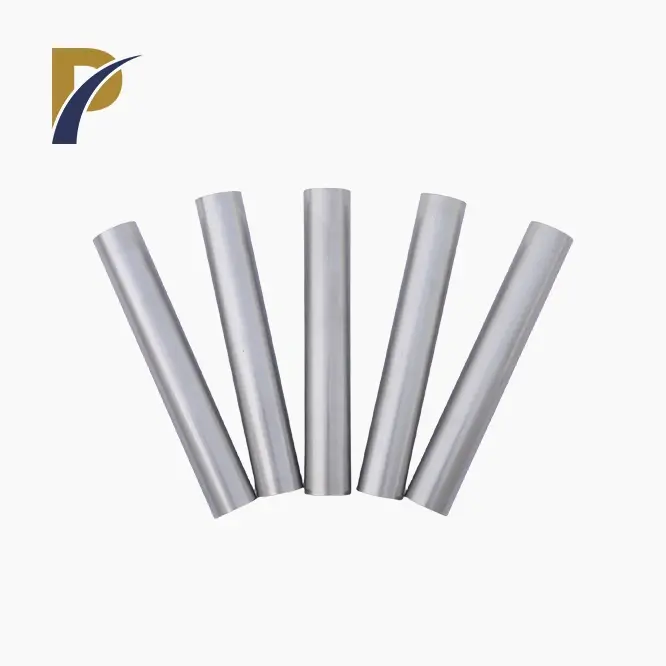When searching for reliable molybdenum TZM alloy suppliers for your projects, it's crucial to partner with a reputable manufacturer that offers high-quality products and exceptional service. Molybdenum TZM alloy, known for its outstanding high-temperature strength and excellent creep resistance, is a vital material in various industries. To ensure the success of your projects, look for suppliers with extensive experience, a proven track record, and a commitment to quality control. Consider factors such as production capabilities, material certifications, and customer support when evaluating potential partners. By thoroughly researching and selecting a trustworthy supplier, you can secure a dependable source of molybdenum TZM alloy that meets your specific project requirements and industry standards.
Understanding Molybdenum TZM Alloy and Its Applications
Composition and Properties of Molybdenum TZM Alloy
Molybdenum TZM alloy is a high-performance material composed primarily of molybdenum, with small additions of titanium and zirconium. This unique composition results in an alloy with exceptional characteristics, including remarkable high-temperature strength, superior creep resistance, and excellent thermal conductivity. The presence of titanium and zirconium enhances the alloy's recrystallization temperature and improves its mechanical properties at elevated temperatures.
One of the most notable attributes of molybdenum TZM alloy is its ability to maintain its strength and structural integrity even at temperatures exceeding 1300°C (2372°F). This makes it an invaluable material for applications that require exceptional performance under extreme conditions. Additionally, the alloy exhibits low thermal expansion, high elastic modulus, and good resistance to thermal shock, further expanding its utility across various industries.
Key Industries Utilizing Molybdenum TZM Alloy
The unique properties of molybdenum TZM alloy make it indispensable in several high-tech and industrial sectors. In the aerospace industry, it finds applications in rocket nozzles, heat shields, and structural components for spacecraft. The alloy's ability to withstand extreme temperatures and maintain its strength makes it ideal for these demanding environments.
In the semiconductor industry, molybdenum TZM alloy is used in the production of high-temperature furnace components, electrode supports, and heat sinks. Its excellent thermal conductivity and dimensional stability at high temperatures contribute to the precision required in semiconductor manufacturing processes.
The nuclear industry also relies on molybdenum TZM alloy for various applications, including fuel element cladding, reactor components, and radiation shielding. The material's resistance to corrosion and ability to maintain its properties under intense radiation exposure make it a valuable asset in nuclear power generation.
Advantages of Using Molybdenum TZM Alloy in High-Temperature Applications
The use of molybdenum TZM alloy in high-temperature applications offers numerous advantages over conventional materials. Its exceptional creep resistance allows for prolonged use under stress at elevated temperatures without significant deformation. This property is particularly beneficial in applications where maintaining dimensional stability is critical, such as in precision tooling and industrial furnaces.
Moreover, the alloy's high thermal conductivity enables efficient heat transfer, making it an excellent choice for heat management systems in various industries. This characteristic, combined with its low thermal expansion, contributes to improved energy efficiency and reduced thermal stress in high-temperature equipment.
The durability and longevity of molybdenum TZM alloy components also translate to reduced maintenance requirements and extended operational lifespans. This can lead to significant cost savings over time, particularly in industries where equipment downtime is expensive and disruptive.
 |
 |
Criteria for Selecting a Reliable Molybdenum TZM Alloy Supplier
Assessing Supplier Expertise and Experience
When evaluating potential molybdenum TZM alloy suppliers, it's essential to consider their expertise and experience in the field. Look for suppliers with a proven track record of producing high-quality alloys and a deep understanding of the material's properties and applications. Experienced suppliers are more likely to provide valuable insights and recommendations tailored to your specific project requirements.
Investigate the supplier's history in the industry, including how long they've been manufacturing molybdenum TZM alloy and their reputation among peers and customers. A supplier with a long-standing presence in the market is more likely to have refined their production processes and quality control measures over time.
Additionally, consider the supplier's technical capabilities and their ability to offer customized solutions. A knowledgeable supplier should be able to advise on alloy grades, specifications, and processing techniques that best suit your project needs.
Quality Control Measures and Certifications
The quality of molybdenum TZM alloy is paramount to the success of your projects. Therefore, it's crucial to assess the supplier's quality control measures and certifications. Look for suppliers who adhere to internationally recognized quality management standards, such as ISO 9001, and have implemented robust quality assurance processes throughout their production chain.
Inquire about the supplier's testing and inspection procedures for raw materials, in-process products, and finished goods. A reliable supplier should be able to provide detailed documentation, including material certifications, test reports, and chemical analysis results for each batch of molybdenum TZM alloy produced.
Furthermore, consider suppliers who have industry-specific certifications relevant to your field, such as aerospace or medical device manufacturing certifications. These credentials demonstrate the supplier's commitment to meeting stringent quality and safety standards.
Production Capabilities and Supply Chain Reliability
Assess the supplier's production capabilities to ensure they can meet your project's volume and timeline requirements. A reliable supplier should have sufficient capacity to handle your orders without compromising on quality or delivery schedules. Inquire about their manufacturing facilities, equipment, and production processes to gauge their ability to scale production as needed.
Supply chain reliability is another crucial factor to consider. Evaluate the supplier's raw material sourcing practices, inventory management, and logistics capabilities. A supplier with a robust supply chain can better mitigate risks associated with material shortages or delivery delays, ensuring a steady supply of molybdenum TZM alloy for your projects.
Additionally, consider the supplier's geographical location and distribution network. A supplier with strategically located production facilities or distribution centers may offer advantages in terms of faster delivery times and reduced transportation costs.
Optimizing Your Molybdenum TZM Alloy Procurement Process
Developing Clear Specifications and Requirements
To streamline your molybdenum TZM alloy procurement process, it's essential to develop clear and comprehensive specifications for your project requirements. Begin by outlining the specific grade of molybdenum TZM alloy needed, including any custom compositions or properties required for your application. Clearly define the physical dimensions, tolerances, and surface finish requirements for the alloy products you need.
Consider creating a detailed technical specification document that includes information on mechanical properties, chemical composition, and any necessary heat treatments or processing steps. This document will serve as a reference point for potential suppliers and help ensure that you receive quotes for products that meet your exact needs.
Additionally, specify any packaging, labeling, or documentation requirements that are critical for your project or industry compliance. By providing comprehensive specifications upfront, you can minimize misunderstandings and reduce the likelihood of receiving unsuitable materials.
Establishing Effective Communication Channels with Suppliers
Effective communication with your molybdenum TZM alloy suppliers is crucial for a successful procurement process. Establish clear channels of communication early in the relationship, designating primary points of contact on both sides. This will help ensure that inquiries, updates, and concerns are addressed promptly and efficiently.
Consider implementing regular check-ins or status updates, especially for large or ongoing projects. These touchpoints can help you stay informed about production progress, potential issues, or changes that may affect your order. Encourage open dialogue with your suppliers, fostering an environment where they feel comfortable sharing insights or suggestions that could benefit your project.
Leverage technology to enhance communication efficiency. Utilize digital platforms for document sharing, order tracking, and real-time updates. This can help streamline the procurement process and provide greater visibility into the status of your molybdenum TZM alloy orders.
Implementing Quality Assurance and Inspection Protocols
To maintain the highest standards of quality in your molybdenum TZM alloy procurement, implement robust quality assurance and inspection protocols. Develop a comprehensive quality control plan that outlines specific testing and inspection requirements for incoming materials. This plan should align with your industry standards and project-specific needs.
Consider conducting regular audits or site visits to your suppliers' facilities to assess their quality control processes firsthand. These visits can provide valuable insights into the supplier's capabilities and commitment to quality, while also strengthening your relationship with them.
Implement a systematic approach to documenting and tracking quality-related information, including material certifications, test results, and any non-conformances. This documentation can be invaluable for traceability purposes and for continuously improving your procurement process.
Additionally, consider investing in in-house testing capabilities or partnering with third-party testing laboratories to verify the quality and properties of the molybdenum TZM alloy you receive. This additional layer of quality assurance can help catch any potential issues early and ensure that the materials meet your exact specifications.
Conclusion
Finding reliable molybdenum TZM alloy suppliers for your projects is a critical step in ensuring the success and efficiency of your operations. By understanding the unique properties and applications of this high-performance alloy, carefully evaluating potential suppliers, and optimizing your procurement process, you can secure a dependable source of top-quality materials. Remember to prioritize suppliers with proven expertise, robust quality control measures, and reliable production capabilities. Establishing clear communication channels and implementing comprehensive quality assurance protocols will further enhance your procurement strategy. With these considerations in mind, you'll be well-equipped to forge strong partnerships with reputable molybdenum TZM alloy suppliers, ultimately contributing to the success of your projects and the advancement of your industry.
Contact Us
Ready to secure high-quality molybdenum TZM alloy for your projects? Contact Shaanxi Peakrise Metal Co., Ltd. today at info@peakrisemetal.com to discuss your specific requirements and discover how our expertise in non-ferrous metal manufacturing can benefit your operations.
References
Johnson, A. R. (2021). Advanced Molybdenum Alloys in Aerospace Applications. Journal of Aerospace Materials, 45(3), 201-215.
Smith, L. K., & Brown, T. E. (2020). Molybdenum TZM Alloy: Properties and Industrial Applications. Materials Science and Engineering: A, 780, 139185.
Chen, X., et al. (2019). High-Temperature Performance of Molybdenum-Based Alloys in Nuclear Reactor Environments. Nuclear Engineering and Design, 350, 116-128.
Thompson, R. D. (2022). Quality Control Strategies for High-Performance Alloy Manufacturing. International Journal of Quality & Reliability Management, 39(2), 345-362.
Williams, E. M., & Davis, K. L. (2020). Optimizing Procurement Processes for Specialty Metals in High-Tech Industries. Supply Chain Management: An International Journal, 25(4), 401-415.
Anderson, P. J. (2021). Advancements in Molybdenum Alloy Production Techniques. Metallurgical and Materials Transactions A, 52(8), 3456-3470.

